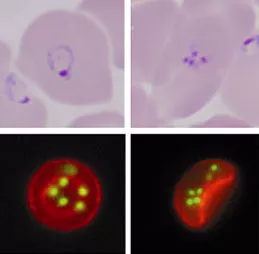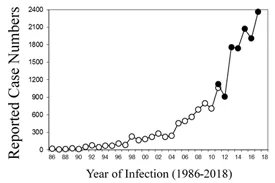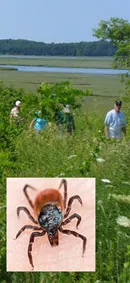June 26, 2020 – Dr. Vannier presents his work at the Virtual Research Symposium organized by the Global Lyme Alliance. The title of his talk is “Exploring the Antibody Response to Babesia microti”.
April 20, 2020 – Dr. Vannier is an author on the study that demonstrates the efficacy of clofazimine against severe Babesia microti infection in highly immunocompromised mice. This study is published in The Journal of Infectious Diseases (10.1093/infdis/jiaa195).
March 15, 2019 – Dr. Vannier presents his work at the Annual Research Symposium organized by the Global Lyme Alliance in Tarrytown, NY. His presentation is entitled “The Role of Antibodies in Babesia microti Infection”.
September 11-14, 2018 – Dr. Vannier contributes two presentations at the 15th International Conference on Lyme Borreliosis and other Tick-borne Diseases held in Atlanta, GA. The first poster is entitled “Identification of Babesia microti antigens for the development of therapeutic antibodies”; the second poster is entitled “A reservoir-targeted vaccine against Borrelia burgdorferi reduces the prevalence of Babesia microti infected ticks”.
August 22, 2018 – Dr. Vannier delivers a keynote lecture entitled “An Appraisal of Human Babesiosis in the USA” at the 14th International Congress of Parasitology in Daegu, South Korea.
April 12, 2018 – Dr. Vannier gives a presentation entitled “The Humoral Response in Babesiosis – Simply a Biomarker?” at the 1st Human Babesiosis Meeting that convened at Yale University in New Haven, CT.
February 3, 2017 – Dr. Vannier participates in the presentation and discussion of a human case of babesiosis during Grand Rounds at Tufts Medical Center in Boston, MA.
November 15, 2016 – Dr. Vannier gives a presentation on the “The Rationale for an Antibody-based Therapy in Severe Babesiosis” at the 65th Annual Meeting of the American Society of Tropical Medicine and Hygiene in Atlanta, GA.
May 14, 2016 – Drs. Gelfand and Vannier jointly provide an appraisal entitled “Babesiosis: Critical Issues” during the 2nd Conference on Lyme Disease and Tick-Borne Illnesses organized at the Massachusetts General Hospital in Boston, MA.
September 27, 2015 – Dr. Vannier gives a presentation entitled “Aging resets the genetic architecture of host resistance to babesiosis” at the 14th International Conference on Lyme Borreliosis and Other Tick-Borne Diseases in Vienna, Austria.
November 10, 2014 – Dr. Vannier contributes a talk entitled “Immune Basis for Resolution of Severe Babesiosis” during a monthly gathering of the Boston Area Parasitology Symposium (BAPS) organized at the T. Chen Harvard School of Public Health, Boston, MA.
June 4, 2014 – Dr. Vannier, in collaboration with Dr. John Leong, Chief of Molecular Biology and Microbiology at Tufts University School of Medicine and Dr. Arlin Rogers, Associate Professor at the Tufts Cummings School of Veterinary Medicine, is granted a Tufts Collaborates! Award for the project entitled “A Novel Genetic Determinant of Susceptibility to Colonic Inflammation”. The proposed research will use the Citrobacter rodentium mouse model to determine whether a novel determinant of susceptibility to babesiosis confers susceptibility to colonic inflammation.
April 23, 2014 – Dr. Vannier is granted funds by the National Research Center for Protozoan Diseases (NRCPD) and Obihiro University of Agriculture and Veterinary Medicine (OUAVM) for the research project entitled “Identification of Novel Therapeutics for Babesiosis”. This project will be carried out in collaboration with Pr. Ikuo Igarashi (NRCPD and OUAVM).
December 9, 2013 – Dr. Vannier gives a lecture entitled “Determinants of Host Resistance to Babesiosis, an Emerging Infectious Disease” at the National Research Center for Protozoan Diseases in Obihiro, Hokkaido, Japan.
August 19, 2013 – Dr. Vannier presents his research on the “Immune Basis for Resolution of Babesia microti Infection in Immunosuppressed Hosts” at the 13th International Conference of Lyme Borreliosis and Other Tick-Borne Diseases in Boston, MA.
August 15, 2013 – Dr. Vannier gives a presentation entitled “Cytokines in Host Resistance to Babesiosis, an Emerging Infectious Disease” at the Special Symposium organized by the Interleukin Foundation at the University of Colorado in Denver, CO.
Read the Press Release by the National Research Fund for Tick-Borne Diseases on February 15, 2013. Dr. Vannier receives one of their four awards in support of his groundbreaking research on the genetic variations that predispose people to severe babesiosis.
Read the New York Times article entitled Another Tick-Borne Disease to Guard Against published on July 30, 2012. This article highlights the importance of babesiosis research and Dr. Vannier's role in shaping how this research is being conducted.


